Case Study: Positive Leadership
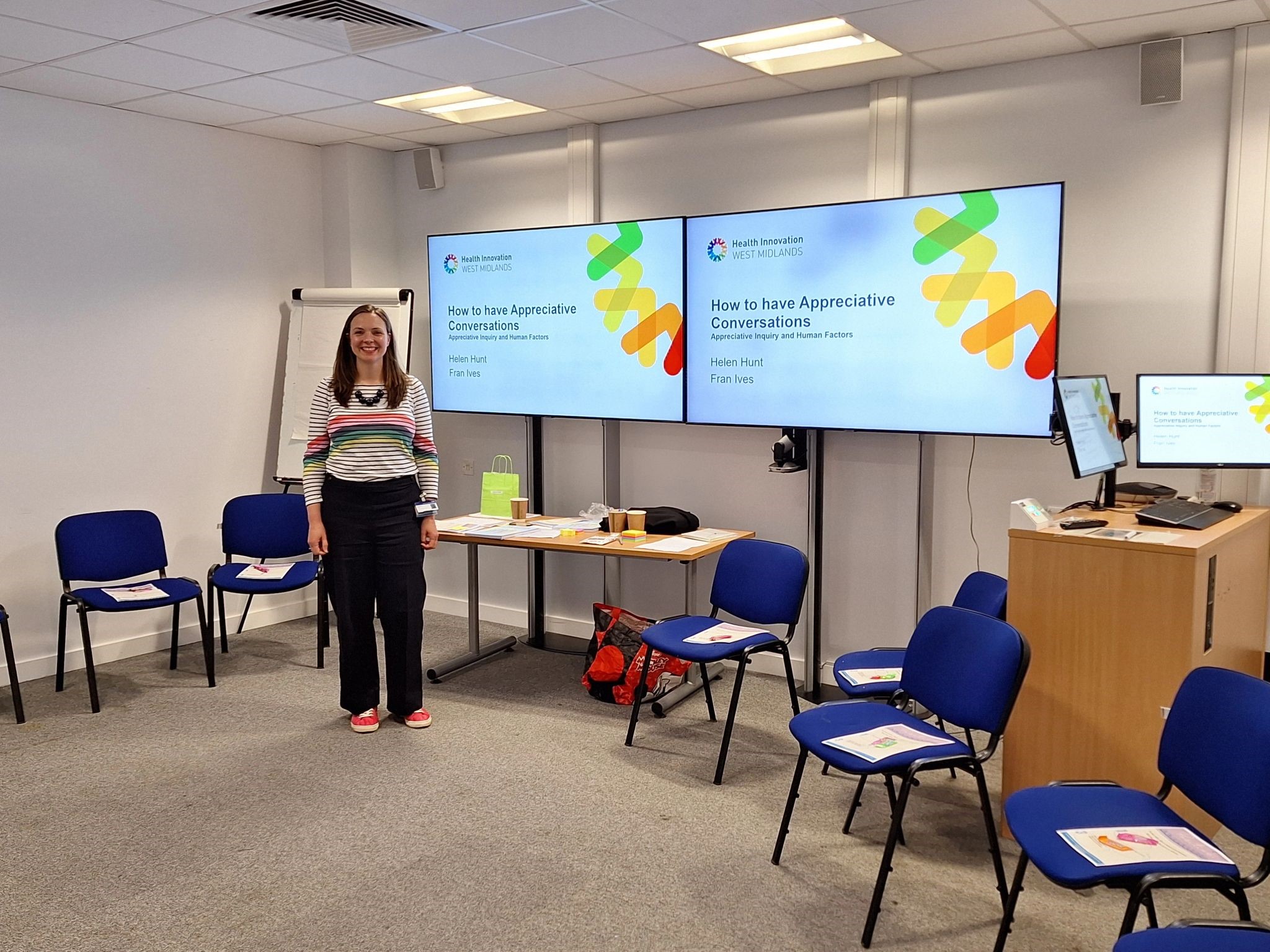
Appreciative Conversations – a workshop forming part of the University Hospitals Birmingham Care and Compassion: Fostering a culture of civility day on 7th June 2024
Overview
Health Innovation West Midlands was invited to conduct an Appreciative Inquiry (AI) and Human Factors workshop during the “Care and Compassion: Fostering a Culture of Civility” day in June 2024. The workshop aimed to introduce AI and Human Factors concepts to participants, many of whom were unfamiliar with these topics. The session included two exercises:
- Personal Story Sharing: Participants shared personal stories of success, focusing on leadership or personal experiences. They listened and identified strengths in each other’s stories. Facilitators modelled this exercise to help participants understand the expectations.
- Good Leadership Moments: Participants shared instances of good leadership they had experienced or witnessed. They answered supplementary questions about what made the leadership effective, what enabled it, and what could enhance future leadership moments. Key themes emerged from 41 responses:
- Behaviours
- Characteristics
- Communication
- Leadership
Analysis revealed that:
- Behaviours such as reflection, goal orientation, observation, and teamwork were consistently highlighted.
- Personal characteristics including honesty, trust, kindness, and inclusivity appeared frequently.
- Leadership characteristics included organisational skills.
- Communication characteristics featured effective listening, positive communication, and feedback.
The insights from the workshop can be leveraged by UHB to enhance their efforts in improving civility and culture. By focusing on the identified key behaviours and characteristics that contribute to effective leadership, UHB can nurture these qualities. The workshop model can be replicated in UHB or other organizations to gain further insights into effective leadership practices.
Problem
2023/24 has been a year of challenge, change, scrutiny, and action as UHB embarked on new ways of working, at significant pace.
Led by the new Chair and CEO, the intensive change programme is addressing concerns raised by regulators, stakeholders and media around patient safety, governance, and culture. It has also been supported by findings from CQC inspections and three independently commissioned reviews, including the voices of over 4,500 colleagues in the culture review, as well as 7,000 colleagues in the national staff survey.
UHB is building a values-led culture to support its 24,000 colleagues to do their very best for patients, by being kind, connected and bold – and, as Chair Dame Yve Buckland acknowledged, cultural change cannot be achieved quickly or superficially, emphasising the significant work ahead to ensure these changes are felt by all colleagues. Consequently, the Trust has been working hard to address the areas of concern, with improving culture and civility at their heart.
Intervention
Health Innovation West Midlands was invited to deliver an Appreciative Inquiry (AI) and Human Factors workshop at the Care and Compassion: Fostering a culture of civility day in June 2024. The workshop was to form part of a group of sessions delivered twice to delegates attending the day.
The aim of the workshop was to provide a short introduction to AI and Human Factors to enable those who were unfamiliar with either or both areas to gain some understanding and context before being given the opportunity to participate in group activities.
The first of the two exercises asked the group to work in pairs and share a short story of what has gone well either at home or work. The story could focus on leadership at work or something at home such as parenting. Whilst the story was being shared, the listener in the pair was asked to listen and then reflect a strength that they had heard in the story. The people in the group were largely unknown or unfamiliar to each other and therefore asking them to share a personal story at the beginning of a workshop can feel like a daunting prospect. It was therefore important that the facilitators role modelled the exercise in order help the group understand better what was expected of them in terms of both sharing and listening. The story shared during this role modelling highlighted trust between two colleagues and was very personal to both facilitators.
Despite most of the group not knowing each other, the conversations flowed and bringing the exercise to a close was challenging due to the storytelling taking place. The second exercise gave the group longer to focus on their conversations and delve a little deeper. The group was asked to share a moment of good leadership that they were either part of, or, witnessed. The listener was given three supplementary questions to ask:
- What was good about it?
- What enabled it to be like that?
- What one thing could help more leadership moments like that happen?
Each person was given a sheet of paper on which to note down their key thoughts during the conversations. These sheets were left at the end of the exercise for the key learning points to be
understood. A total of 41 responses were collected and the responses from all questions were themed. For each of the three questions, four overarching themes emerged:
- Behaviours
- Characteristics
- Communication
- Leadership
The responses and themes for each of the three questions posted by the listener were considered in greater depth.
Share a moment of good leadership that you were either part of, or witnessed. What was good about it?
When asked to identify what was good about the shared leadership moment, the strongest theme to emerge was personal characteristics, closely followed by behaviours.
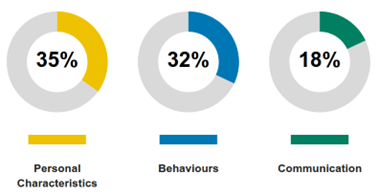
The most frequently mentioned personal characteristic was ‘open-mindedness’ followed by ‘empathy’ and ‘emotional intelligence’.
What enabled it to be like that?
When asked to identify what enabled the leadership moment to be good, the strongest theme to emerge was leadership followed by communication and then behaviours.
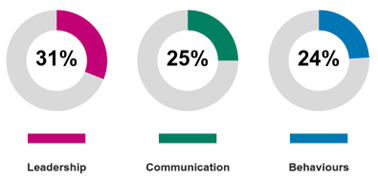
The most cherished leadership qualities were ‘good leadership’ followed by ‘team rapport’ and ‘support’.
What one thing could help make more leadership moments like that happen?
When asked to identify what one thing could enable more leadership moments like that to happen, by far the strongest theme was behaviours followed by personal characteristics and then leadership.
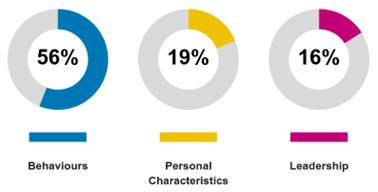
The behaviours that were noted as being enablers for more positive leadership moments to happen included ‘recognition, and ‘positive reinforcement’.
Combined behaviours
The data was examined more thoroughly to identify specific behaviours, characteristics, communication, and leadership elements noted by the group. Additionally, the analysis sought to determine whether any of these elements appeared in more than one of the questions the group was asked to consider. For instance, did any behaviours identified in response to “what made it good” also appear in the responses to the questions “what enabled it to be like that?” or “what one thing could help make more leadership moments like that happen?” All behaviours listed in each of the three questions were then combined to see if any were repeated across two or more questions.
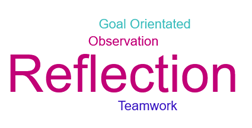
- Reflection was the behaviour that featured in all three questions
- Goal orientated, observation and teamwork featured in questions 1 and 3
Combined personal characteristics
All personal characteristics listed in each of the three questions were combined to determine if any appeared two or more of the questions.
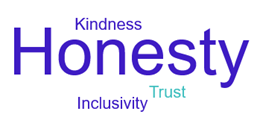
- Honesty features across all three questions
- Trust, kindness and inclusivity featured in two questions
Combined leadership characteristics
All leadership characteristics listed in each of the three questions were combined to determine if any appeared two or more of the questions.

- Organisation skills identified in two questions
Combined communication characteristics
All the communication characteristics listed in each of the three questions were combined to determine if any appeared two or more of the questions.

- Effective listening and positive communication featured in all three questions
- Feedback featured in two questions
Summary of behaviours, personal, communication and leadership characteristics
The table below summarises the top behaviours, personal characteristics, leadership characteristics and communication characteristics.

Future plans or next steps
The insights gained from the workshop can be utilised by UHB in their efforts to improve civility and culture. By identifying the key behaviours and characteristics that staff believe contribute to effective leadership moments, the organisation can focus on fostering and encouraging these qualities.
The workshop can be replicated again at UHB, or, in other organisations, allowing for additional insights to deepen the understanding of what contributes to effective leadership.
Call to action
Taking the time to listen to staff and their experiences can yield significant insights. The Appreciative Inquiry workshop allowed staff to engage with colleagues they might not have met before. Although some were initially apprehensive, the depth of conversation and the extensive data collected demonstrated that even brief exercises, such as those in the workshop, can lead to valuable learning. By focusing on positive leadership moments rather than negative ones, Appreciative Inquiry facilitated a different but highly productive learning experience.
